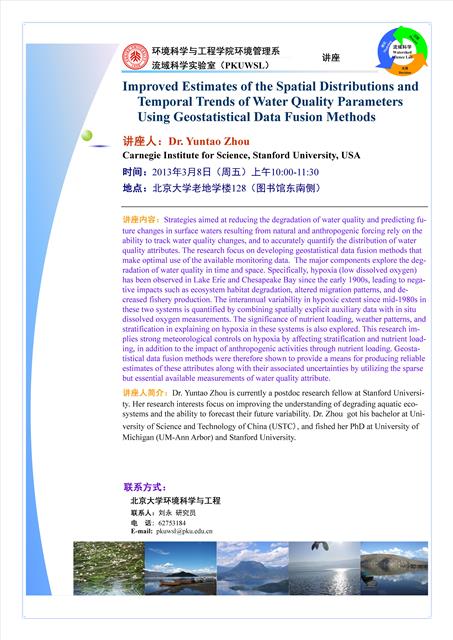美国斯坦福大学卡内基研究院Dr. Yuntao Zhou 应邀于2013年3月8日访问北京大学环境科学与工程学院并作讲座,讲座由刘永研究员主持。她的讲座题目为“”Improved Estimates of the Spatial Distributions and Temporal Trends of Water Quality Parameters Using Geostatistical Data Fusion Methods“.Dr. Zhou结合自己多年研究成果,较为系统地介绍了河口低氧问题,以及她利用地统计方法Universal Kringging 结合Conditional relization所预测的低氧爆发区体积与爆发频次。
讲座内容:Strategies aimed at reducing the degradation of water quality and predicting future changes in surface waters resulting from natural and anthropogenic forcing rely on the ability to track water quality changes, and to accurately quantify the distribution of water quality attributes. The research focus on developing geostatistical data fusion methods that make optimal use of the available monitoring data. The major components explore the degradation of water quality in time and space. Specifically, hypoxia (low dissolved oxygen) has been observed in Lake Erie and Chesapeake Bay since the early 1900s, leading to negative impacts such as ecosystem habitat degradation, altered migration patterns, and decreased fishery production. The interannual variability in hypoxic extent since mid-1980s in these two systems is quantified by combining spatially explicit auxiliary data with in situ dissolved oxygen measurements. The significance of nutrient loading, weather patterns, and stratification in explaining on hypoxia in these systems is also explored. This research implies strong meteorological controls on hypoxia by affecting stratification and nutrient loading, in addition to the impact of anthropogenic activities through nutrient loading. Geostatistical data fusion methods were therefore shown to provide a means for producing reliable estimates of these attributes along with their associated uncertainties by utilizing the sparse but essential available measurements of water quality attribute.
讲座人简介:Dr. Yuntao Zhou is currently a postdoc research fellow at Stanford University. Her research interests focus on improving the understanding of degrading aquatic ecosystems and the ability to forecast their future variability. Dr. Zhou got his bachelor at University of Science and Technology of China (USTC), and fished her PhD at University of Michigan (UM-Ann Arbor) and Stanford University.

